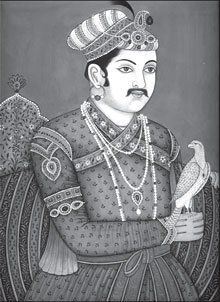Birbal: Management guru sans an MBA
 Master of Business Administration (MBA) is a prestigious degree in
management. Those who wish to pass the MBA should be ready to spend a
fortune. However, William Shakespeare, Attila the Hun, Winnie the Pooh,
Mulla Nasiruddin, Confucius and Jesus Christ knew what management meant.
Even some philosophical and religious books such as Zen, Taoism, the
Kabballah, the Bible, the Bhagawad Gita and Sufism have identified
various management and leadership styles with finesse. Master of Business Administration (MBA) is a prestigious degree in
management. Those who wish to pass the MBA should be ready to spend a
fortune. However, William Shakespeare, Attila the Hun, Winnie the Pooh,
Mulla Nasiruddin, Confucius and Jesus Christ knew what management meant.
Even some philosophical and religious books such as Zen, Taoism, the
Kabballah, the Bible, the Bhagawad Gita and Sufism have identified
various management and leadership styles with finesse.
On a lesser scale, Birbal who served Akbar the Great illustrates his
sagacity and problem-solving acumen although he did not have an MBA.
Each Birbal story spells out a management moral, giving an insight into
various mundane problems. What is more, Birbal, the legendary guru
sparks anybody’s creative thinking.
Akbar the Great ruled India from 1560 to 1605. He was a benevolent
ruler who commanded the respect of his people and admiration of his
enemies. He was an emperor with a difference. Akbar was an excellent
horse rider, swordsman and a brilliant marksman. His courage knew no
bounds. His lightning conquests of India from Hindu Kush to Bengal were
feats of military genius.
Precious asset
Although Akbar was fabulously rich, his most precious asset was his
quick-witted Wazir, popularly known as Birbal. He was not a mythical
character like Attila the Hun. Birbal was a poor Brahmin who lived in
Tikawanpur on the banks of the River Jamuna. By virtue of his
razor-sharp wit, he became a minister at Akbar’s court. He was also a
poet who wrote under the pseudonym “Brahma”. A collection of his verses
is preserved in the Bharatpur Museum.
 |
|
Emperor Akbar the Great |
As many latter-day storytellers have invented Birbal stories, we
really do not know whether they are authentic. However, the fact remains
that most of the stories attributed to Birbal are based on practical
psychology, sociology and management principles. Although Akbar the
Great was an all-powerful emperor, Birbal’s wisdom overshadowed his
master’s intelligence. In most of the stories, Birbal gets the emperor
out of all kinds of difficult situations.
According to historians, Akbar had a mobile court, a tradition he had
inherited from his nomadic ancestors. The emperor sometimes ruled from
Agra and on other occasions from Lahore. He also held court at Fatehpur
Sikri, a city especially built for himself. In one of his mobile courts,
Akbar announced that he would give 1,000 gold coins to any artist who
produced the most realistic portrait of the emperor.
Perfect portrait
Many artists lined up to show their portraits to the emperor.
However, Akbar rejected every one of them. Then Mahesh Das, a poor
Brahmin, presented his work to the emperor. The Brahmin begged the
emperor to look at it and satisfy himself. Akbar looked at the
“painting” and saw himself with all the features intact. He was so
elated that he gave the bag of gold coins to Mahesh Das. In fact, what
he gave the emperor was not a painting but a mirror! The story teaches
us two management rules. The first is that we have to give what the
client wants. The second is that we should communicate what we have in
mind frankly and diplomatically.
Once Akbar sent Birbal on a mission to Kabul. The king in Kabul
suspected Birbal to be a spy and started questioning him. Birbal told
the king that he was just a traveller. The king wanted to know what
Birbal thought about his rule. Birbal lost no time in comparing the king
to the full moon. Then the king asked Birbal what he thought about
Akbar. Birbal compared Akbar to the new moon.
Before Birbal returned home Akbar came to know about everything his
minister had uttered. When he was questioned, Birbal did not deny what
he had said. Akbar was furious and demanded an explanation. Birbal said
he compared the emperor to the new moon because it was the sign of
increasing prosperity. He compared the king in Kabul to the full moon as
he was destined to decline in power. Birbal won the day, confirming the
management rule that we should use words tactfully without denigrating
anyone. Again it was a lesson in diplomacy.
Birbal’s stories open up a treasure-trove of wisdom for anyone who
wishes to be a practical psychologist, a wayside philosopher or a
pragmatic manager of human affairs.
|



